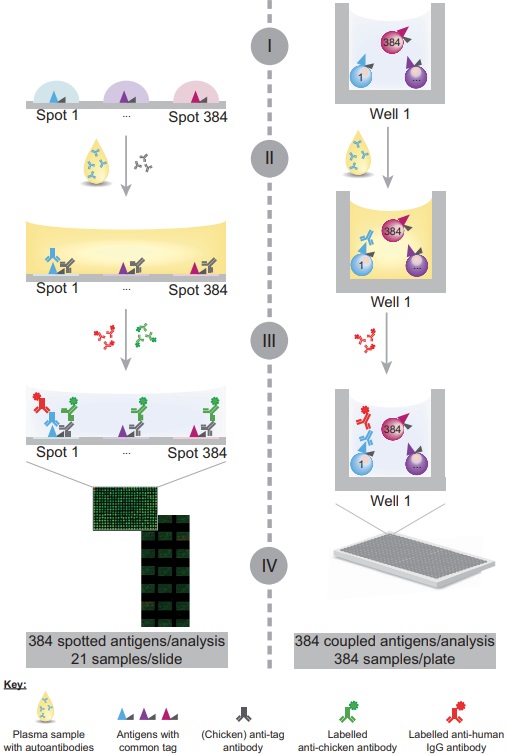NAA Service for Cardiovascular Diseases
The role of autoimmunity in cardiovascular diseases (CVD) has been increasingly recognized. Autoimmunity is most commonly examined by the levels of circulating natural autoantibodies (NAA) in clinical practices. Measurement of NAA remains to be challenging because of the deficiency of sensitive, reproducible, and standardized assays. With years of experience in antigen-antibody interaction and autoantibody analysis, the professional team of Creative Biolabs can provide customers with comprehensive NAA services for various cardiovascular diseases.
Natural Autoantibodies and Cardiovascular Diseases
An increased risk of CVD has long been recognized amongst people with autoimmune disease. CVDs are the leading cause of worldwide death every year. It accounts for over 30% of deaths on a global level, translating to approximately 17.5 million deaths annually. CVDs are heterogeneous and include coronary heart disease (CHD), peripheral vascular disease (PVD), valvular heart disease (VHD), and stroke. The main pathological process that underlies the majority of these CVD manifestations is NAA Associated Atherosclerosis, a chronic inflammatory response to lipid products in the walls of large and medium arteries. Both antibodies generated following cognate antigen encounter and NAAs produced independently of infection and in the absence of T cell help have been demonstrated to modulate the natural history of multiple forms of CVD including atherosclerosis, NAA Associated Myocarditis, dilated cardiomyopathy, and valvular heart diseases.
 Fig.1 Autoantibodies in myocarditis and dilated cardiomyopathy. (Meier, 2018)
Fig.1 Autoantibodies in myocarditis and dilated cardiomyopathy. (Meier, 2018)
NAA Biomarkers and Profiling Methods
A wealth of data points towards a potential role of autoantibodies both as drivers of inflammation as well as independent factors associated with CVD risk. Existing papers have largely been focused on delineating the role of defined autoantigens such as heat shock protein (HSP)-60, oxidized low-density lipoprotein (ox-LDL) and beta 2 glycoprotein 1 (β2GP1) and their associated autoantibodies, in the development of atherosclerosis-related CVD. Multiple methods have been developed for autoantibody profiling, such as immunosensors, ELISA, luciferase immunoprecipitation systems (LIPS), antigen arrays, bead arrays and so on. Several new platforms with high reproducibility and consistency are constantly emerging. Taking a nanotechnology-based plasmonic gold chip, for example, this multiplexed assay targets key structural cardiac proteins as well as several key pathways involved in the pathophysiology of CVDs and allows simultaneous detection of 10 cardiovascular autoantibodies.
 Fig.2 The technique for evaluating autoantibody responses using planar and bead-based antigen arrays.2
Fig.2 The technique for evaluating autoantibody responses using planar and bead-based antigen arrays.2
Features of Our Technologies
- Multiple methods: ELISA /WB /Dot Blot / LIPS
- High throughput methods: protein array / peptide array
- Multiple affinity protein profiling (MAPPing)
- Low cost
- Best after-sale services
NAA can directly target intracellular structures or intracellular enzymes. Empowered by our advanced high-resolution analytical platforms and experienced technical personnel, the analytical division in Creative Biolabs is fully competent and dedicated to serving as your comprehensive NAA analysis provider to assist our clients perform NAA affinity measurement, profiling, epitope mapping and so on. If you need these services now, please do not hesitate to contact us for more information.
References
- Meier, Lee A., and Bryce A. Binstadt. "The contribution of autoantibodies to inflammatory cardiovascular pathology." Frontiers in immunology 9 (2018): 911.
- Ayoglu, Burcu, et al. "Autoantibody profiling in multiple sclerosis using arrays of human protein fragments." Molecular & Cellular Proteomics 12.9 (2013): 2657-2672.
Choosing natural autoantibody (NAA) microarray to profile autoantibody repertoire and reveal novel disease's marker.
Related Services:
- Autoimmune Disorders
- Infectious Diseases
- Neurological Diseases
- Endocrine Diseases
- Hematological Diseases
- Nephropathy
- Pulmonary Diseases
- Cancers

